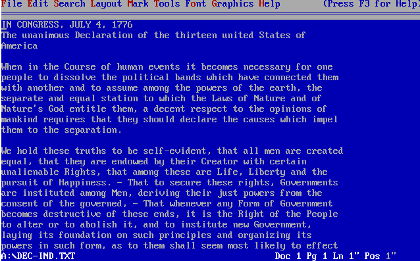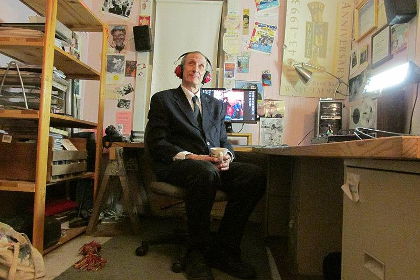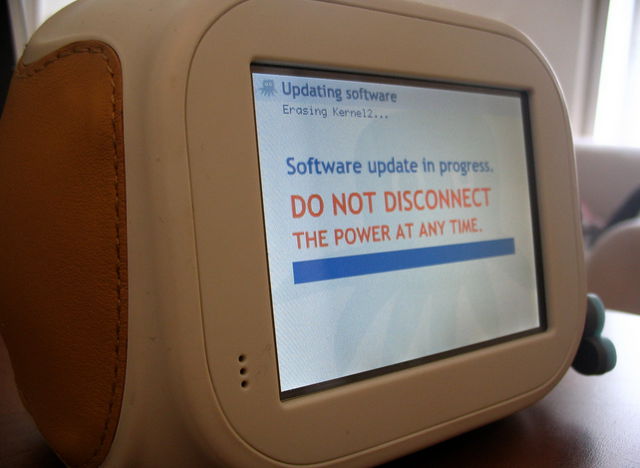Jonathan Dodd‘s latest column. Guest opinion articles do not necessarily reflect the views of the publication. Ed
As owners of computers, we’re all reminded sometimes of the need to update our software. Nowadays we can get reminders of new versions of our most-used programs, and they can annoy us by downloading and installing for ages, stopping us from starting to work. Or surf.
As I often say to myself, a watched install never boils. And while I sit and stare at the messages telling me not to log off because it’s in the middle of installing part 17 of 32, I remind myself that new versions are good, because they’re up to date and often fix problems or make our computers safer from outside harm.
Some lost and forgotten word-processing program
I have quite a few folders in the depths of my machine’s memory that were created using early versions of Word, or even earlier versions of some lost and forgotten word-processing program.

If I want to read these, I have to go through some complicated manoeuvres, usually involving opening them as text files, stripping out a lot of rubbish, and copy-and-pasting them into new Word documents. It’s worth doing, not because I ever find hidden gems of writing, but because I notice how much I have improved as a writer.
Not knowing what had gone
I would hate to have these old files deleted or lost, in the same way that I would hate losing my own memories, not because they might be of use or value, but because I would probably be aware of a hole, an absence in the fabric and continuity of my life, and not knowing what had gone would gnaw away at me.

One of the problems with actual memories is the way they’ve been stored and what we need to do to retrieve them. Many of our memories are held in much the same way as my old word-processor files. My memory has to do a lot of work to get them back, and I have to adjust my viewing of the memories according to who I am now and how things have changed.
Everything is saved and remembered somewhere
I absolutely believe that everything that happens, in its entirety, in every moment of our inner and our lives, is saved and remembered somewhere. We don’t usually have the capacity to organise all of this material, so it all goes in willy-nilly, often in a chaotic way, and we never get the chance to go back and sort it all out.

I was reminded of this recently when I was remembering a certain medical emergency in my past (see previous columns…). I was having a conversation with someone about her ex- or late-husband, and she vividly recounted a couple of memories that gave me a clear understand of how he was. I asked her whether she thought he would have changed by now, and she had no idea.
My installed version of my mother
What we do with people is this. We install them in our minds just like software, and they remain there just as they are unless we update them. I remember my installed version of my mother actually wagging her finger at me several years after she had died, and telling me not to dial 999 unless it was an actual emergency.

I remember having an argument with her, and being unable to make the 999 call three times. I phoned my doctor instead, which could even have saved my life, because I could hardly talk by then, and he knew my address and phoned for the ambulance, which saved a lot of time. I have no idea whether it was my mother or my installed version of her that made me do it that way, but Thank You Mum anyway. Bless her.
Confusing the rehearsals with the real thing
I remember also a job a few years ago when I had a team leader who kept muttering at me across our desks. Things like – “Yes, you’re right!”, or “No, I didn’t think you’d agree.” I work in I.T., so I’m used to people being a little weird sometimes, so I didn’t mind, until we went for a meeting and he came out with a ream of ideas and said that we had discussed and agreed it, when I knew we hadn’t.

I took him to one side and we had a conversation with him about this. We worked it out that he had an installed version of me inside his head, with which he was having vivid conversations, almost like rehearsing his arguments. The trouble was that he was confusing the rehearsals with the real thing, and I was being cut out of the process completely.
But have you actually talked to her?
We sorted it all out and carried on working well together, but I was always curious about how common this phenomenon is, and what effect it might have on our lives. I’m reminded of an old New Yorker cartoon, where a businessman sits in a bar getting drunk and chatting up a rather bored woman sitting next to him. “My wife doesn’t understand me!” he said. Her reply was this – “But have you actually talked to her?”

All this would be interesting or funny, until we think about the other side of the thing. We’re hearing a lot about children who have been abused, growing up unable to trust anyone or form proper relationships, going on to suffer mental health issues, maybe self-harming or worse, and in extreme cases visiting the same horrors on young people, thus turning the whole thing into a cycle.
The horror of their experiences
Years ago we might have said that they had demons in their heads. I think they may have installed versions of their abusers in there, which reflect the horror of their experiences so powerfully that they are unable to lead normal lives. I feel so sorry for them, and so angry with the people who have infested their minds and destroyed their lives.

I see the same sort of thing happening to veterans of war and torture and disasters, ruining their lives and the lives of those they love and who love them. There are techniques out there that can help, but we spend so much time avoiding unpleasant thoughts and casually blaming the obvious things without thinking enough about what’s really happening, and then we complain about the expense.
I’ve allowed her to rest now
I’m thankful that my mother was such a powerful figure in my childhood, and I’m grateful that she was there when I needed her, in life and in my head. Perhaps that’s part of our immortality. But since I realised I had put her in there, I’ve allowed her to rest now, and I’ve been going through my mind looking for other people I’ve installed. When I find them I update their software, or delete them altogether.
Occasionally I’m very happy to let my installed versions stay. I have Gregory Peck in there, playing Atticus Finch in To Kill a Mocking Bird. When he speaks to me, I listen.

To all of you out there who find you have old and unhelpful versions of installed people in your heads, I wish you luck in updating them so you can take charge.
If you have been, thank you for reading this.
Image: Butterseite under CC BY 2.0
Image: Public Domain
Image: US Army Corps of Engineers under CC BY 2.0
Image: liftarn under CC BY 2.0
Image: Joe Bev under CC BY 2.0
Image: mike-burns under CC BY 2.0
Image: Public Domain
Image: Yomangani tarafından yuklendi under CC BY 2.0





